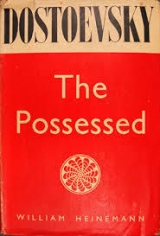
Текст книги "The Possessed"
Автор книги: Федор Достоевский
сообщить о нарушении
Текущая страница: 23 (всего у книги 49 страниц)
Of his native language he had only an ungrammatical knowledge, like many of his race in Russia. This turn for versifying drew him to a gloomy and depressed schoolfellow, the son of a poor Russian general, who was considered in the school to be a great future light in literature. The latter patronised him. But it happened that three years after leaving school this melancholy schoolfellow, who had flung up his official career for the sake of Russian literature, and was consequently going about in torn boots, with his teeth chattering with cold, wearing a light summer overcoat in the late autumn, met, one day on the Anitchin bridge, his former protege, “Lembka,” as he always used to be called at school. And, what do you suppose? He did not at first recognise him, and stood still in surprise. Before him stood an irreproachably dressed young man with wonderfully well-kept whiskers of a reddish hue, with pince-nez, with patent-leather boots, and the freshest of gloves, in a full overcoat from Sharmer's, and with a portfolio under his arm. Lembke was cordial to his old schoolfellow, gave him his address, and begged him to come and see him some evening. It appeared, too, that he was by now not “Lembka” but “Von Lembke.” The schoolfellow came to see him, however, simply from malice perhaps. On the staircase, which was covered with red felt and was rather ugly and by no means smart, he was met and questioned by the house-porter. A bell rang loudly upstairs. But instead of the wealth which the visitor expected, he found Lembke in a very little side-room, which had a dark and dilapidated appearance, partitioned into two by a large dark green curtain, and furnished with very old though comfortable furniture, with dark green blinds on high narrow windows. Von Lembke lodged in the house of a very distant relation, a general who was his patron. He met his visitor cordially, was serious and exquisitely polite. They talked of literature, too, but kept within the bounds of decorum. A manservant in a white tie brought them some weak tea and little dry, round biscuits. The schoolfellow, from spite, asked for some seltzer water. It was given him, but after some delays, and Lembke was somewhat embarrassed at having to summon the footman a second time and give him orders. But of himself he asked his visitor whether he would like some supper, and was obviously relieved when he refused and went away. In short, Lembke was making his career, and was living in dependence on his fellow-countryman, the influential general.
He was at that time sighing for the general's fifth daughter, and it seemed to him that his feeling was reciprocated. But Amalia was none the less married in due time to an elderly factory-owner, a German, and an old comrade of the general's. Andrey Antonovitch did not shed many tears, but made a paper theatre. The curtain drew up, the actors came in, and gesticulated with their arms. There were spectators in the boxes, the orchestra moved their bows across their fiddles by machinery, the conductor waved his baton, and in the stalls officers and dandies clapped their hands. It was all made of cardboard, it was all thought out and executed by Lembke himself. He spent six months over this theatre. The general arranged a friendly party on purpose. The theatre was exhibited, all the general's five daughters, including the newly married Amalia with her factory-owner, numerous fraus and frauleins with their men folk, attentively examined and admired the theatre, after which they danced. Lembke was much gratified and was quickly consoled.
The years passed by and his career was secured. He always obtained good posts and always under chiefs of his own race; and he worked his way up at last to a very fine position for a man of his age. He had, for a long time, been wishing to marry and looking about him carefully. Without the knowledge of his superiors he had sent a novel to the editor of a magazine, but it had not been accepted. On the other hand, he cut out a complete toy railway, and again his creation was most successful. Passengers came on to the platform with bags and portmanteaux, with dogs and children, and got into the carriages. The guards and porters moved away, the bell was rung, the signal was given, and the train started off. He was a whole year busy over this clever contrivance. But he had to get married all the same. The circle of his acquaintance was fairly wide, chiefly in the world of his compatriots, but his duties brought him into Russian spheres also, of course. Finally, when he was in his thirty-ninth year, he came in for a legacy. His uncle the baker died, and left him thirteen thousand roubles in his will. The one thing needful was a suitable post. In spite of the rather elevated style of his surroundings in the service, Mr. von Lembke was a very modest man. He would have been perfectly satisfied with some independent little government post, with the right to as much government timber as he liked, or something snug of that sort, and he would have been content all his life long. But now, instead of the Minna or Ernestine he had expected, Yulia Mihailovna suddenly appeared on the scene. His career was instantly raised to a more elevated plane. The modest and precise man felt that he too was capable of ambition.
Yulia Mihailovna had a fortune of two hundred serfs, to reckon in the old style, and she had besides powerful friends. On the other hand Lembke was handsome, and she was already over forty. It is remarkable that he fell genuinely in love with her by degrees as he became more used to being betrothed to her. On the morning of his wedding day he sent her a poem. She liked all this very much, even the poem; it's no joke to be forty. He was very quickly raised to a certain grade and received a certain order of distinction, and then was appointed governor of our province.
Before coming to us Yulia Mihailovna worked hard at moulding her husband. In her opinion he was not without abilities, he knew how to make an entrance and to appear to advantage, he understood how to listen and be silent with profundity, had acquired a quite distinguished deportment, could make a speech, indeed had even some odds and ends of thought, and had caught the necessary gloss of modern liberalism. What worried her, however, was that he was not very open to new ideas, and after the long, everlasting plodding for a career, was unmistakably beginning to feel the need of repose. She tried to infect him with her own ambition, and he suddenly began making a toy church: the pastor came out to preach the sermon, the congregation listened with their hands before them, one lady was drying her tears with her handkerchief, one old gentleman was blowing his nose; finally the organ pealed forth. It had been ordered from Switzerland, and made expressly in spite of all expense. Yulia Mihailovna, in positive alarm, carried off the whole structure as soon as she knew about it, and locked it up in a box in her own room. To make up for it she allowed him to write a novel on condition of its being kept secret. From that time she began to reckon only upon herself. Unhappily there was a good deal of shallowness and lack of judgment in her attitude. Destiny had kept her too long an old maid. Now one idea after another fluttered through her ambitious and rather over-excited brain. She cherished designs, she positively desired to rule the province, dreamed of becoming at once the centre of a circle, adopted political sympathies. Von Lembke was actually a little alarmed, though, with his official tact, he quickly divined that he had no need at all to be uneasy about the government of the province itself. The first two or three months passed indeed very satisfactorily. But now Pyotr Stepanovitch had turned up, and something queer began to happen.
The fact was that young Verhovensky, from the first step, had displayed a flagrant lack of respect for Andrey Antonovitch, and had assumed a strange right to dictate to him; while Yulia Mihailovna, who had always till then been so jealous of her husband's dignity, absolutely refused to notice it; or, at any rate, attached no consequence to it. The young man became a favourite, ate, drank, and almost slept in the house. Von Lembke tried to defend himself, called him “young man” before other people, and slapped him patronisingly on the shoulder, but made no impression. Pyotr Stepanovitch always seemed to be laughing in his face even when he appeared on the surface to be talking seriously to him, and he would say the most startling things to him before company. Returning home one day he found the young man had installed himself in his study and was asleep on the sofa there, uninvited. He explained that he had come in, and finding no one at home had “had a good sleep.”
Von Lembke was offended and again complained to his wife. Laughing at his irritability she observed tartly that he evidently did not know how to keep up his own dignity; and that with her, anyway, “the boy” had never permitted himself any undue familiarity, “he was naive and fresh indeed, though not regardful of the conventions of society.” Von Lembke sulked. This time she made peace between them. Pyotr Stepanovitch did not go so far as to apologise, but got out of it with a coarse jest, which might at another time have been taken for a fresh offence, but was accepted on this occasion as a token of repentance. The weak spot in Andrey Antonovitch's position was that he had blundered in the first instance by divulging the secret of his novel to him. Imagining him to be an ardent young man of poetic feeling and having long dreamed of securing a listener, he had, during the early days of their acquaintance, on one occasion read aloud two chapters to him. The young man had listened without disguising his boredom, had rudely yawned, had vouchsafed no word of praise; but on leaving had asked for the manuscript that he might form an opinion of it at his leisure, and Andrey Antonovitch had given it him. He had not returned the manuscript since, though he dropped in every day, and had turned off all inquiries with a laugh. Afterwards he declared that he had lost it in the street. At the time Yulia Mihailovna was terribly angry with her husband when she heard of it.
“Perhaps you told him about the church too?” she burst out almost in dismay.
Von Lembke unmistakably began to brood, and brooding was bad for him, and had been forbidden by the doctors. Apart from the fact that there were signs of trouble in the province, of which we will speak later, he had private reasons for brooding, his heart was wounded, not merely his official dignity. When Andrey Antonovitch had entered upon married life, he had never conceived the possibility of conjugal strife, or dissension in the future. It was inconsistent with the dreams he had cherished all his life of his Minna or Ernestine. He felt that he was unequal to enduring domestic storms. Yulia Mihailovna had an open explanation with him at last.
“You can't be angry at this,” she said, “if only because you've still as much sense as he has, and are immeasurably higher in the social scale. The boy still preserves many traces of his old free-thinking habits; I believe it's simply mischief; but one can do nothing suddenly, in a hurry; you must do things by degrees. We must make much of our young people; I treat them with affection and hold them back from the brink.”
“But he says such dreadful things,” Von Lembke objected. “I can't behave tolerantly when he maintains in my presence and before other people that the government purposely drenches the people with vodka in order to brutalise them, and so keep them from revolution. Fancy my position when I'm forced to listen to that before every one.”
As he said this, Von Lembke recalled a conversation he had recently had with Pyotr Stepanovitch. With the innocent object of displaying his Liberal tendencies he had shown him his own private collection of every possible kind of manifesto, Russian and foreign, which he had carefully collected since the year 1859, not simply from a love of collecting but from a laudable interest in them. Pyotr Stepanovitch, seeing his object, expressed the opinion that there was more sense in one line of some manifestoes than in a whole government department, “not even excluding yours, maybe.”
Lembke winced.
“But this is premature among us, premature,” he pronounced almost imploringly, pointing to the manifestoes.
“No, it's not premature; you see you're afraid, so it's not premature.”
“But here, for instance, is an incitement to destroy churches.”
“And why not? You're a sensible man, and of course you don't believe in it yourself, but you know perfectly well that you need religion to brutalise the people. Truth is honester than falsehood. . . .”
“I agree, I agree, I quite agree with you, but it is premature, premature in this country . . .” said Von Lembke, frowning.
“And how can you be an official of the government after that, when you agree to demolishing churches, and marching on Petersburg armed with staves, and make it all simply a question of date?”
Lembke was greatly put out at being so crudely caught.
“It's not so, not so at all,” he cried, carried away and more and more mortified in his amour-propre. “You're young, and know nothing of our aims, and that's why you're mistaken. You see, my dear Pyotr Stepanovitch, you call us officials of the government, don't you? Independent officials, don't you? But let me ask you, how are we acting? Ours is the responsibility, but in the long run we serve the cause of progress just as you do. We only hold together what you are unsettling, and what, but for us, would go to pieces in all directions. We are not your enemies, not a bit of it. We say to you, go forward, progress, you may even unsettle things, that is, things that are antiquated and in need of reform. But we will keep you, when need be, within necessary limits, and so save you from yourselves, for without us you would set Russia tottering, robbing her of all external decency, while our task is to preserve external decency. Understand that we are mutually essential to one another. In England the Whigs and Tories are in the same way mutually essential to one another. Well, you're Whigs and we're Tories. That's how I look at it.”
Andrey Antonovitch rose to positive eloquence. He had been fond of talking in a Liberal and intellectual style even in Petersburg, and the great thing here was that there was no one to play the spy on him.
Pyotr Stepanovitch was silent, and maintained an unusually grave air. This excited the orator more than ever.
“Do you know that I, the 'person responsible for the province,'” he went on, walking about the study, “do you know I have so many duties I can't perform one of them, and, on the other hand, I can say just as truly that there's nothing for me to do here. The whole secret of it is, that everything depends upon the views of the government. Suppose the government were ever to found a republic, from policy, or to pacify public excitement, and at the same time to increase the power of the governors, then we governors would swallow up the republic; and not the republic only. Anything you like we'll swallow up. I, at least, feel that I am ready. In one word, if the government dictates to me by telegram, activite devorante,I'll supply activite devorante.I've told them here straight in their faces: 'Dear sirs, to maintain the equilibrium and to develop all the provincial institutions one thing is essential; the increase of the power of the governor.' You see it's necessary that all these institutions, the zemstvos, the law-courts, should have a two-fold existence, that is, on the one hand, it's necessary they should exist (I agree that it is necessary), on the other hand, it's necessary that they shouldn't. It's all according to the views of the government. If the mood takes them so that institutions seem suddenly necessary, I shall have them at once in readiness. The necessity passes and no one will find them under my rule. That's what I understand by activite devorante,and you can't have it without an increase of the governor's power. We're talking tete-a-tete.You know I've already laid before the government in Petersburg the necessity of a special sentinel before the governor's house. I'm awaiting an answer.”
“You ought to have two,” Pyotr Stepanovitch commented.
“Why two?” said Von Lembke, stopping short before him.
“One's not enough to create respect for you. You certainly ought to have two.”
Andrey Antonovitch made a wry face.
“You . . . there's no limit to the liberties you take, Pyotr Stepanovitch. You take advantage of my good-nature, you say cutting things, and play the part of a bourru bienfaisant. . . .”
“Well, that's as you please,” muttered Pyotr Stepanovitch; “anyway you pave the way for us and prepare for our success.”
“Now, who are 'we,' and what success?” said Von Lembke, staring at him in surprise. But he got no answer.
Yulia Mihailovna, receiving a report of the conversation, was greatly displeased.
“But I can't exercise my official authority upon your favourite,” Andrey Antonovitch protested in self-defence, “especially when we're tete-a-tete. . . .I may say too much . . . in the goodness of my heart.”
“From too much goodness of heart. I didn't know you'd got a collection of manifestoes. Be so good as to show them to me.”
“But . . . he asked to have them for one day.”
“And you've let him have them, again!” cried Yulia Mihailovna getting angry. “How tactless!”
“I'll send some one to him at once to get them.”
“He won't give them up.”
“I'll insist on it,” cried Von Lembke, boiling over, and he jumped up from his seat. “Who's he that we should be so afraid of him, and who am I that I shouldn't dare to do any thing?”
“Sit down and calm yourself,” said Yulia Mihailovna, checking him. “I will answer your first question. He came to me with the highest recommendations. He's talented, and sometimes says extremely clever things. Karmazinov tells me that he has connections almost everywhere, and extraordinary influence over the younger generation in Petersburg and Moscow. And if through him I can attract them all and group them round myself, I shall be saving them from perdition by guiding them into a new outlet for their ambitions. He's devoted to me with his whole heart and is guided by me in everything.”
“But while they're being petted . . . the devil knows what they may not do. Of course, it's an idea . . .” said Von Lembke, vaguely defending himself, “but . . . but here I've heard that manifestoes of some sort have been found in X district.”
“But there was a rumour of that in the summer – manifestoes, false bank-notes, and all the rest of it, but they haven't found one of them so far. Who told you?”
“ Iheard it from Von Blum.”
“Ah, don't talk to me of your Blum. Don't ever dare mention him again!”
Yulia Mihailovna flew into a rage, and for a moment could not speak. Von Blum was a clerk in the governor's office whom she particularly hated. Of that later.
“Please don't worry yourself about Verhovensky,” she said in conclusion. “If he had taken part in any mischief he wouldn't talk as he does to you, and every one else here. Talkers are not dangerous, and I will even go so far as to say that if anything were to happen I should be the first to hear of it through him. He's quite fanatically devoted to me.”
I will observe, anticipating events that, had it not been for Tulia Mihailovna's obstinacy and self-conceit, probably nothing of all the mischief these wretched people succeeded in bringing about amongst us would have happened. She was responsible for a great deal
Last updated on Wed Jan 12 09:26:22 2011 for eBooks@Adelaide.
The Possessed, by Fyodor Dostoyevsky
Chapter V. On the Eve Op the Fete
the date of the fete which Yulia Mihailovna was getting up for the benefit of the governesses of our province had been several times fixed and put off. She had invariably bustling round her Pyotr Stepanovitch and a little clerk, Lyamshin, who used at one time to visit Stepan Trofimovitch, and had suddenly found favour in the governor's house for the way he played the piano and now was of use running errands. Liputin was there a good deal too, and Yulia Mihailovna destined him to be the editor of a new independent provincial paper. There were also several ladies, married and single, and lastly, even Karmazinov who, though he could not be said to bustle, announced aloud with a complacent air that he would agreeably astonish every one when the literary quadrille began. An extraordinary multitude of donors and subscribers had turned up, all the select society of the town; but even the unselect were admitted, if only they produced the cash. Yulia Mihailovna observed that sometimes it was a positive duty to allow the mixing of classes, “for otherwise who is to enlighten them?”
A private drawing-room committee was formed, at which it was decided that the fete was to be of a democratic character. The enormous list of subscriptions tempted them to lavish expenditure. They wanted to do something on a marvellous scale – that's why it was put off. They were still undecided where the ball was to take place, whether in the immense house belonging to the marshal's wife, which she was willing to give up to them for the day, or at Varvara Petrovna's mansion at Skvoreshniki. It was rather a distance to Skvoreshniki, but many of the committee were of opinion that it would be “freer” there. Varvara Petrovna would dearly have liked it to have been in her house. It's difficult to understand why this proud woman seemed almost making up to Yulia Mihailovna. Probably what pleased her was that the latter in her turn seemed almost fawning upon Nikolay Vsyevolodovitch and was more gracious to him than to anyone. I repeat again that Pyotr Stepanovitch was always, in continual whispers, strengthening in the governor's household an idea he had insinuated there already, that Nikolay Vsyevolodovitch was a man who had very mysterious connections with very mysterious circles, and that he had certainly come here with some commission from them.
People here seemed in a strange state of mind at the time. Among the ladies especially a sort of frivolity was conspicuous, and it could not be said to be a gradual growth. Certain very free-and-easy notions seemed to be in the air. There was a sort of dissipated gaiety and levity, and I can't say it was always quite pleasant. A lax way of thinking was the fashion. Afterwards when it was all over, people blamed Yulia Mihailovna, her circle, her attitude. But it can hardly have been altogether due to Yulia Mihailovna. On the contrary; at first many people vied with one another in praising the new governor's wife for her success in bringing local society together, and for making things more lively. Several scandalous incidents took place, for which Yulia Mihailovna was in no way responsible, but at the time people were amused and did nothing but laugh, and there was no one to check them. A rather large group of people, it is true, held themselves aloof, and had views of their own on the course of events. But even these made no complaint at the time; they smiled, in fact.
I remember that a fairly large circle came into existence, as it were, spontaneously, the centre of which perhaps was really to be found in Yulia Mihailovna's drawing-room. In this intimate circle which surrounded her, among the younger members of it, of course, it was considered admissible to play all sorts of pranks, sometimes rather free-and-easy ones, and, in fact, such conduct became a principle among them. In this circle there were even some very charming ladies. The young people arranged picnics, and even parties, and sometimes went about the town in a regular cavalcade, in carriages and on horseback. They sought out adventures, even got them up themselves, simply for the sake of having an amusing story to tell. They treated our town as though it were a sort of Glupov. People called them the jeerers or sneerers, because they did not stick at anything. It happened, for instance, that the wife of a local lieutenant, a little brunette, very young though she looked worn out from her husband's ill-treatment, at an evening party thoughtlessly sat down to play whist for high stakes in the fervent hope of winning enough to buy herself a mantle, and instead of winning, lost fifteen roubles. Being afraid of her husband, and having no means of paying, she plucked up the courage of former days and ventured on the sly to ask for a loan, on the spot, at the party, from the son of our mayor, a very nasty youth, precociously vicious. The latter not only refused it, but went laughing aloud to tell her husband. The lieutenant, who certainly was poor, with nothing but his salary, took his wife home and avenged himself upon her to his heart's content in spite of her shrieks, wails, and entreaties on her knees for forgiveness. This revolting story excited nothing but mirth all over the town, and though the poor wife did not belong to Yulia Mihailovna's circle, one of the ladies of the “cavalcade,” an eccentric and adventurous character who happened to know her, drove round, and simply carried her off to her own house. Here she was at once taken up by our madcaps, made much of, loaded with presents, and kept for four days without being sent back to her husband. She stayed at the adventurous lady's all day long, drove about with her and all the sportive company in expeditions about the town, and took part in dances and merry-making. They kept egging her on to haul her husband before the court and to make a scandal. They declared that they would all support her and would come and bear witness. The husband kept quiet, not daring to oppose them. The poor thing realised at last that she had got into a hopeless position and, more dead than alive with fright, on the fourth day she ran off in the dusk from her protectors to her lieutenant. It's not definitely known what took place between husband and wife, but two shutters of the low-pitched little house in which the lieutenant lodged were not opened for a fortnight. Yulia Mihailovna was angry with the mischief-makers when she heard about it all, and was greatly displeased with the conduct of the adventurous lady, though the latter had presented the lieutenant's wife to her on the day she carried her off. However, this was soon forgotten.
Another time a petty clerk, a respectable head of a family, married his daughter, a beautiful girl of seventeen, known to every one in the town, to another petty clerk, a young man who came from a different district. But suddenly it was learned that the young husband had treated the beauty very roughly on the wedding night, chastising her for what he regarded as a stain on his honour. Lyamshin, who was almost a witness of the affair, because he got drunk at the wedding and so stayed the night, as soon as day dawned, ran round with the diverting intelligence.
Instantly a party of a dozen was made up, all of them on horseback, some on hired Cossack horses, Pyotr Stepanovitch, for instance, and Liputin, who, in spite of his grey hairs, took part in almost every scandalous adventure of our reckless youngsters. When the young couple appeared in the street in a droshky with a pair of horses to make the calls which are obligatory in our town on the day after a wedding, in spite of anything that may happen, the whole cavalcade, with merry laughter, surrounded the droshky and followed them about the town all the morning. They did not, it's true, go into the house, but waited for them outside, on horseback. They refrained from marked insult to the bride or bridegroom, but still they caused a scandal. The whole town began talking of it. Every one laughed, of course. But at this Von Lembke was angry, and again had a lively scene with Yulia Mihailovna. She, too, was extremely angry, and formed the intention of turning the scapegraces out of her house. But next day she forgave them all after persuasions from Pyotr Stepanovitch and some words from Karmazinov, who considered the affair rather amusing.
“It's in harmony with the traditions of the place,” he said. “Anyway it's characteristic and . . . bold; and look, every one's laughing, you're the only person indignant.”
But there were pranks of a certain character that were absolutely past endurance.
A respectable woman of the artisan class, who went about selling gospels, came into the town. People talked about her, because some interesting references to these gospel women had just appeared in the Petersburg Capers. Again the same buffoon, Lyamshin, with the help of a divinity student, who was taking a holiday while waiting for a post in the school, succeeded, on the pretence of buying books from the gospel woman, in thrusting into her bag a whole bundle of indecent and obscene photographs from abroad, sacrificed expressly for the purpose, as we learned afterwards, by a highly respectable old gentleman (I will omit his name) with an order on his breast, who, to use his own words, loved “a healthy laugh and a merry jest.” When the poor woman went to take out the holy books in the bazaar, the photographs were scattered about the place. There were roars of laughter and murmurs of indignation. A crowd collected, began abusing her, and would have come to blows if the police had not arrived in the nick of time. The gospel woman was taken to the lock-up, and only in the evening, thanks to the efforts of Mavriky Nikolaevitch, who had learned with indignation the secret details of this loathsome affair, she was released and escorted out of the town. At this point Yulia Mihailovna would certainly have forbidden Lyamshin her house, but that very evening the whole circle brought him to her with the intelligence that he had just composed a new piece for the piano, and persuaded her at least to hear it. The piece turned out to be really amusing, and bore the comic title of “The Franco-Prussian War.” It began with the menacing strains of the “Marseillaise “:








